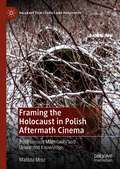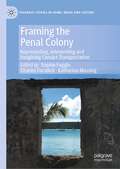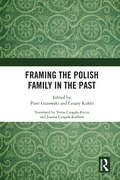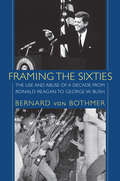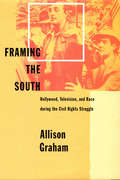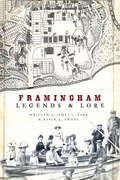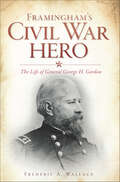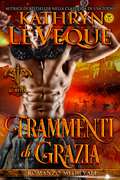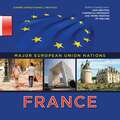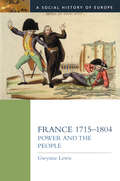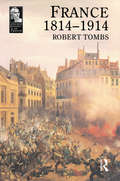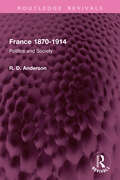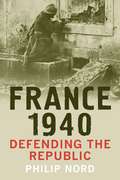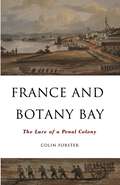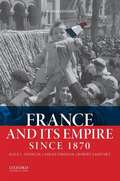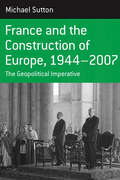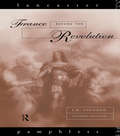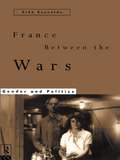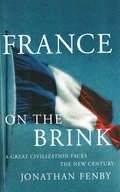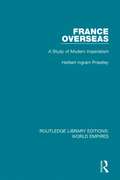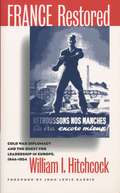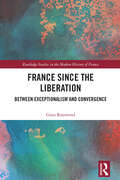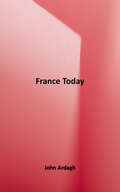- Table View
- List View
Framing the Holocaust in Polish Aftermath Cinema: Posthumous Materiality and Unwanted Knowledge (Palgrave Film Studies and Philosophy)
by Matilda MrozThis book offers a unique perspective on contemporary Polish cinema’s engagement with histories of Polish violence against their Jewish neighbours during the Holocaust. Moving beyond conventional studies of historical representation on screen, the book considers how cinema reframes the unwanted knowledge of violence in its aftermaths. The book draws on Derridean hauntology, Didi-Huberman’s confrontations with art images, Levinasian ethics and anamorphosis to examine cinematic reconfigurations of histories and memories that are vulnerable to evasion and formlessness. Innovative analyses of Birthplace (Łoziński, 1992), It Looks Pretty From a Distance (Sasnal, 2011), Aftermath (Pasikowski, 2012), and Ida (Pawlikowski, 2013) explore how their rural filmic landscapes are predicated on the radical exclusion of Jewish neighbours, prompting archaeological processes of exhumation. Arguing that the distressing materiality of decomposition disturbs cinematic composition, the book examines how Poland’s aftermath cinema attempts to recompose itself through form and narrative as it faces Polish complicity in Jewish death.
Framing the Penal Colony: Representing, Interpreting and Imagining Convict Transportation (Palgrave Studies in Crime, Media and Culture)
by Charles Forsdick Sophie Fuggle Katharina MassingThis book examines the representation of penal colonies both historically and in contemporary culture, across an array of media. Exploring a range of geographies and historical instances of the penal colony, it seeks to identify how the ‘penal colony’ as a widespread phenomenon is as much ‘imagined’ and creatively instrumentalized as it pertains to real sites and populations. It concentrates on the range of ‘media’ produced in and around penal colonies both during their operation and following their closures. This approach emphasizes the role of cross-disciplinary methods and approaches to examining the history and legacy of convict transportation, prison islands and other sites of exile. It develops a range of methodological tools for engaging with cultures and representations of incarceration, detention and transportation. The chapters draw on media discourse analysis, critical cartography, museum and heritage studies, ethnography, architectural history, visual culture including film and comics studies and gaming studies. It aims to disrupt the idea of adopting linear histories or isolated geographies in order to understand the impact and legacy of penal colonies. The overall claim made by the collection is that understanding the cultural production associated with this global phenomenon is a necessary part of a wider examination of carceral imaginaries or ‘penal spectatorship’ (Brown, 2009) past, present and future. It brings together historiography, criminology, media and cultural studies.
Framing the Polish Family in the Past
by Piotr Guzowski Cezary Kuklo Teresa Czogała-Koczy Joanna Czogała-KiełbońThis volume shows how families in different contexts – noble, urban, legal, religious - and across different periods of history from the late Middle Ages to the modern era, shaped the Polish-Lithuanian Commonwealth and its successor states, pre-partitioned and post-partitioned Poland. Contributors draw on a diverse range of different sources including rural and urban court registers, church registers, and population surveys to examine the economic bases of families as well as marital and family conflicts. The sources and the applied research methods enable contributors to characterize families led not only by men but also by single women. New research methods employed include approaches to family structures drawn from sociology, such as life-cycle and life-course analysis, as well as anthropological methods to reconstruct kinship in communities. Spanning several centuries, and from the river Oder to the Black Sea, the Baltic, Lithuania, Belarus and the Ukrainian borderlands, this volume is a major contribution to the historiography on East Central Europe, a region still too often omitted from histories of Europe. Framing the Polish Family in the Past will appeal to researchers and students alike in Polish and Lithuanian History and Medieval and Early Modern Society and Culture.
Framing the Sixties: The Use and Abuse of a Decade from Ronald Reagan to George W. Bush
by Bernard Von BothmerOver the past quarter century, American liberals and conservatives alike have invoked memories of the 1960s to define their respective ideological positions and to influence voters. Liberals recall the positive associations of what might be called the "good Sixties"--the "Camelot" years of JFK, the early civil rights movement, and the dreams of the Great Society--while conservatives conjure images of the "bad Sixties"--a time of urban riots, antiwar protests, and countercultural revolt. In Framing the Sixties, Bernard von Bothmer examines this battle over the collective memory of the decade primarily through the lens of presidential politics. He shows how four presidents--Ronald Reagan, George H. W. Bush, Bill Clinton, and George W. Bush--each sought to advance his political agenda by consciously shaping public understanding of the meaning of "the Sixties." He compares not only the way that each depicted the decade as a whole, but also their commentary on a set of specific topics: the presidency of John F. Kennedy, Lyndon Johnson's "Great Society" initiatives, the civil rights movement, and the Vietnam War. In addition to analyzing the pronouncements of the presidents themselves, von Bothmer draws on interviews he conducted with more than one hundred and twenty cabinet members, speechwriters, advisers, strategists, historians, journalists, and activists from across the political spectrum--from Julian Bond, Daniel Ellsberg, Todd Gitlin, and Arthur Schlesinger to James Baker, Robert Bork, Phyllis Schlafly, and Paul Weyrich. It is no secret that the upheavals of the 1960s opened fissures within American society that have continued to affect the nation's politics and to intensify its so-called culture wars. What this book documents is the extent to which political leaders, left and right, consciously exploited those divisions by "framing" the memory of that turbulent decade to serve their own partisan interests.
Framing the South: Hollywood, Television, and Race during the Civil Rights Struggle
by Allison GrahamWhat patterns emerge in media coverage and character depiction of Southern men and women, blacks and whites, in the years between 1954 and 1976? How do portrayals of the region and the equal rights movement illuminate the spirit and experience of the South—and of the nation as a whole? In Framing the South, Allison Graham examines the ways in which the media, particularly television and film, presented Southerners during the period of the civil rights revolution.Graham analyzes depictions of southern race and social class in a wide range of Hollywood films—including A Streetcar Named Desire, The Three Faces of Eve, and A Face in the Crowd from the 1950s; later films like Cool Hand Luke, In the Heat of the Night, and Mississippi Burning; and MGM's Elvis Presley vehicles. She traces how films have confronted—or avoided—issues of racism over the years, paralleling Hollywood depictions with the tamer characterization of the likeable "hillbilly" popularized in television's The Real McCoys and The Andy Griffith Show. Graham reinforces the political impact of these fictional representations by examining media coverage of civil rights demonstrations, including the documentary Crisis: Behind the Presidential Commitment, which reported the clash between Robert Kennedy and Governor George Wallace over the integration of the University of Alabama. She concludes with a provocative analysis of Forrest Gump, identifying the popular film as a retelling of post-World War II Southern history.
Framingham Legends & Lore
by Kevin A. Swope James L. ParrJust hours after the "shot heard 'round the world" marked the start of the American Revolution, the news from Lexington setalarm bells ringing in Framingham. Minutemen from the town rushed along the road to Concord to help cut off the retreat of British troops. In Salem, where dozens of women were accused of witchcraft, Framingham's founder, Thomas Danforth, helped to end the hysteria and afterward provided sanctuary in Framingham for the families of the wrongfully accused. Staring down the barrels of British guns in Boston, Framingham native Crispus Attucks was one of the first to die for American independence. Though rarely in the foreground of history, Framingham pops up again and again as a backdrop to our nation's great historic episodes. With tales of pirate gold, hypnotized evangelists, blundering spies and bravery in battle, this captivating collection of historical episodes sets Framingham squarely in the spotlight.
Framingham's Civil War Hero: The Life of General George H. Gordon (Civil War Series)
by Frederic A. WallaceGeorge Henry Gordon, who moved to Framingham, Massachusetts, at the age of five, attended the U.S. Military Academy at West Point, where his attitudes toward the country were shaped alongside classmates George McClellan, Thomas �Stonewall� Jackson and Ulysses S. Grant. Gordon went on to hold political and military offices in the North, and as a general in the Union army, he led his troops against Jackson in the Valley Campaign, at Antietam and at the Siege of Charleston. Join historian Frederic A. Wallace as he recounts the largely untold story of General George H. Gordon, Framingham�s favorite son, with personal diary entries and letters that reveal a man of integrity and honor whose actions displayed an outright love for his country.
Frammenti di grazia: Romanzo medievale
by Kathryn Le Veque1291 d.c. - Keir St. Hever è un potente comandante di guarnigione per Lord Coverdale, al confine delle valli della Cumbria. Mentre è impegnato sul campo di battaglia, viene informato del fatto che il suo stesso castello è sotto attacco. Keir torna al castello di Pendragon per scoprire che sua moglie e sua figlia sono state assassinate, mentre il suo giovane figlio è scomparso. Da qui ha inizio la discesa di Keir nell’inferno di una profonda disperazione. Tre anni dopo, Keir è ancora alla ricerca di suo figlio quando viene chiamato a soccorrere la famiglia di un alleato il cui castello è sotto assedio. Keir si fa strada nel mastio, tuttavia la damigella che dovrebbe salvare non crede che sia lì per aiutarla, sicché ne segue un grande scontro. Durante quella lotta, Keir rimane inspiegabilmente ed irrimediabilmente affascinato da Lady Chloe-Louise de Geld. Chloe è una splendida fanciulla, molto ambita, brillante, dolce ed esuberante. Risveglia in Keir emozioni a lungo sopite, sentimenti che credeva morti a seguito della perdita della sua famiglia. Per quanto non voglia amare Chloe, non può farne a meno. Dovrebbe essere impegnato nella ricerca del figlio scomparso, invece i suoi pensieri sono rivolti alla donna di cui è sempre più innamorato. Tuttavia un vicino vendicativo e malvagio, il quale vuole Chloe tutta per sé, viene a sapere dell'interesse di St. Hever e si risolve a far uso di menzogne e macchinazioni per convincere Keir del fatto che abbia suo figlio. Propone uno scambio: Chloe per il ragazzo. Prima che Keir possa prendere una decisione, Chloe agisce di sua iniziativa e la situazione precipita. Tra morti, battaglie, nemici vendicativi e visitatori spettrali, l'amore di Keir e Chloe rimane forte e indistruttibile, ed alla fine Keir dovrà impugnare ancora una volta la sua spada per salvare la donna che ama. Gravato dal ricordo della famiglia che non è stato in grado di salvare, ce la farà?
France (Major European Union Nations)
by Jeanine SannaAs one of the most powerful countries in Europe, France is a key player in the EU. In fact, it was one of the EU's founding members. France has a long history filled with kings, inventors, and revolutions. Today, citizens are asking what it means to be French, as more and more immigrants move to France. Discover more about this exciting, modern nation!
France 1715-1804: Power and the People (Social History of Europe)
by Gwynne LewisGwynne Lewis’ history opens with a full analysis of all the components of traditional France, including political and religious structures, the seigneurial system, the bourgeoisie and the poor. Part two examines the meaning and challenge of the Enlightenment, with particular reference to women and the mass of the poor. Part three concentrates upon the relationship between the shift to laissez-faire economics, popular revolts and government repression, providing the essential background to the Revolutionary decade of the 1790s. The Revolution witnessed the rise of a politicised ‘Popular Movement’ that achieved, briefly, a measure of popular democracy. War and counter-revolution blocked the move towards real democracy, strengthened the authority of the centralised state, and enhanced the credibility of bourgeois political and economic power. One of the main contentions of this work is that the failure of both monarchical and Revolutionary regimes to deal with the massive social problem of poverty played a far larger part in explaining the collapse of the Bourbons in 1789, and the failure of democracy during the 1790s, than most historians have allowed. Likewise, the importance of religion in directing the momentous events of this period has also been under-estimated.
France 1814 - 1914 (Longman History of France)
by Robert TombsHere is an incomparably rich portrait of France in the years when the disparate elements that made up the fragmented kingdom of the ancien regime were forged into the modern nation. The survey begins with an exploration of national obsessions and attitudes. It considers the tendency to revolution and war, the preoccupation with the idea of a New Order and the deep strain of national paranoia that was to be intensified by the dramatic debacle of the Franco-Prussian War. Robert Tombs then investigates the structures of power and in Part Three he turns his attention to social identities, from the individual and family to the nation at large. When every aspect of the period has been put under the microscope, Robert Tombs draws them all into the broad political narrative that brings the book to its rousing conclusion. Bursting with life as well as learning, this is, quite simply, a tour de force.
France 1870-1914 (Seminar Studies)
by Robert GildeaThe period 1870 - 1914 in France saw the consolidation of republican government and the recovery of national self-confidence. Though political crises such as the Dreyfus Affair threatened to tear it apart, the Republic established firm parliamentary rule, built up an Empire and an army which was to see it through the Great War. The new edition of this key text - first published as The Third Republic From 1870 to 1914 - offers a clear introduction to the period and incorporates the latest research.
France 1870-1914: Politics and Society (Routledge Revivals)
by R. D. AndersonFirst published in 1977, France 1870-1914 combines an outline of events with an analytical treatment of the main political institutions and forces of the Third Republic, relating them to their social context. After an introductory narrative chapter, Dr Anderson discusses the social bases of politics, regional variations in political behaviour, parties and political leadership, and the parliamentary system. There are sections on the Republicans and Radicals, the Right, and the working-class movement, and a separate chapter is devoted to foreign and colonial policy. The success of the Third Republic as a working political system and a distinctive form of parliamentary democracy is emphasized. The author also provides a framework of interpretative ideas which makes the book stimulating as well as informative. This is a must read for scholars and researchers of French history and French politics.
France 1940
by Philip NordIn this revisionist account of France's crushing defeat in 1940, a world authority on French history argues that the nation's downfall has long been misunderstood. Philip Nord assesses France's diplomatic and military preparations for war with Germany, its conduct of the war once the fighting began, and the political consequences of defeat on the battlefield. He also tracks attitudes among French leaders once defeat seemed a likelihood, identifying who among them took advantage of the nation's misfortunes to sabotage democratic institutions and plot an authoritarian way forward. Nord finds that the longstanding view that France's collapse was due to military unpreparedeness and a decadent national character is unsupported by fact. Instead, he reveals that the Third Republic was no worse prepared and its military failings no less dramatic than those of the United States and other Allies in the early years of the war. What was unique in France was the betrayal by military and political elites who abandoned the Republic and supported the reprehensible Vichy takeover. Why then have historians and politicians ever since interpreted the defeat as a judgment on the nation as a whole? Why has the focus been on the failings of the Third Republic and not on elite betrayal? The author examines these questions in a fascinating conclusion.
France And Botany Bay: The Lure of a Penal Colony
by Colin ForsterConvict transportation to Britain's colonies in Australia greatly influenced political debate and policy in France. Surprisingly, it's a story that has not previously been told. Depiction of Botany Bay as a moral and economic utopia, and the answer to crime, was the basis of vigorous support for the establishment of a French penal colony. Implacably opposed to transportation were those who saw Botany Bay as a penal disaster. The opposing groups amassed a vast array of material. Debate raged. There were floods of impassioned literature. French ships roamed the world in search of an attractive and viable site for their own Botany Bay, and France came close to settling south-west Australia and New Zealand. In the end, the transportationists won. In 1852 France began transportation to French Guiana and in 1863 to New Caledonia. For both settlements, Botany Bay was the model. Colin Forster tells this fascinating story for the first time.
France And Its Empire Since 1870
by Robert Zaretsky Alice Conklin Sarah FishmanProviding an up-to-date synthesis of the history of an extraordinary nation--one that has been shrouded in myths, many of its own making--France and Its Empire Since 1870 seeks both to understand these myths and to uncover the complicated and often contradictory realities that underpin them. It situates modern French history in transnational and global contexts and also integrates the themes of imperialism and immigration into the traditional narrative. Authors Alice L. Conklin, Sarah Fishman, and Robert Zaretsky begin with the premise that while France and the U.S. are sister republics, they also exhibit profound differences that are as compelling as their apparent similarities. The authors frame the book around the contested emergence of the French Republic--a form of government that finally appears to have a permanent status in France--but whose birth pangs were much more protracted than those of the American Republic. Presenting a lively and coherent narrative of the major developments in France's tumultuous history since 1870, the authors organize the chapters around the country's many turning points and confrontations. They also offer detailed analyses of politics, society, and culture, considering the diverse viewpoints of men and women from every background including the working class and the bourgeoisie, immigrants, Catholics, Jews and Muslims, Bretons and Algerians, rebellious youth, and gays and lesbians.
France And The Construction Of Europe, 1944-2007
by Michael SuttonIn the second half of the twentieth century France played the greatest role - even greater than Germany's - in shaping what eventually became the European Union. By the early twenty-first century, however, in a hugely transformed Europe, this era had patently come to an end. This comprehensive history shows how France coupled the pursuit of power and the furtherance of European integration over a sixty-year period, from the close of the Second World War to the hesitation caused by the French electorate's referendum rejection of the European Union's constitutional treaty in 2005.
France Before the Revolution (Lancaster Pamphlets)
by J. H. ShennanThis fully revised second edition takes account of historical work produced during the last decade. Covering the period between Louis XIV's death in 1715 and the outbreak of the French Revolution in 1789, it discusses: * France's accomplishments in international affairs, commercial expansion, and intellectual and artistic life * the significance of long-term political, social and economic forces in causing the Revolution * how the changing perception of government, from one of divine-right kingship towards the idea of a national enterprise, ultimately undermined the old regime.
France Between the Wars: Gender and Politics
by Sian ReynoldsFirst published in 2004. Routledge is an imprint of Taylor & Francis, an informa company.
France On The Brink: A Great Civilization Faces a New Century
by Jonathan FenbyA renowned journalist shows us France as never before seen, and the view will chill and electrify anyone who loves -- or loves to hate -- the country that not only defined culture but gave us the word itself. The traditional leader in the arts, letters, cuisine, and fashion, France embodies universally admired ideals of political expression and personal freedom. But France's heritage, combined with its glorious history, has also created delusions of grandeur -- the Gaullist conviction that France will always be an "exception". France today is in crisis. High unemployment, an archaic economic system, a self-selecting governing class unable to handle serious problems, and a debilitating nostalgia for things past are dragging it closer to the brink at the very moment of European unification. Urgent, convincing, and unsparing, this eye-opening look at the world's most complex, seductive, and sometimes infuriating country will give even the most knowledgeable Francophile plenty to think about.
France Overseas: A Study of Modern Imperialism (Routledge Library Editions: World Empires #13)
by Herbert Ingram PriestleyOriginally published in 1938. Upon restoration of peace in 1814, recovery of colonial prestige become one of the leading affairs of the French state. First the Old Colonies were reoccupied, then new areas were sought in the Pacific, Asia, and in Africa. This book examines the growth of France overseas in the nineteenth century.
France Restored: Cold War Diplomacy and the Quest for Leadership in Europe, 1944-1954
by William I. HitchcockHistorians of the Cold War, argues William Hitchcock, have toooften overlooked the part that European nations played in shapingthe post-World War II international system. In particular,France, a country beset by economic difficulties and politicalinstability in the aftermath of the war, has been given shortshrift. With this book, Hitchcock restores France to the narrativeof Cold War history and illuminates its central role in thereconstruction of Europe. Drawing on a wide array of evidencefrom French, American, and British archives, he shows that Franceconstructed a coherent national strategy for domestic andinternational recovery and pursued that strategy with tenacityand effectiveness in the first postwar decade. This once-occupiednation played a vital part in the occupation and administrationof Germany, framed the key institutions of the "new" Europe,helped forge the NATO alliance, and engineered an astonishingeconomic recovery. In the process, France successfully contestedAmerican leadership in Europe and used its position as a key ColdWar ally to extract concessions from Washington on a wide rangeof economic and security issues.
France Since the Liberation: Between Exceptionalism and Convergence (Routledge Studies in the Modern History of France)
by Gino RaymondThis book focuses on the tension between the modernising thrust that places France on a trajectory of convergence with comparable liberal democracies and the defence of a national specificity that can act as a brake, complicating France’s relationship with its neighbours, its present and its past. This ambivalence in French political and social life stems from the conscious attempt to rebuild the nation after the trauma of Occupation during World War II and the new beginning provided by the Liberation. The government of the Fourth Republic embraced the pursuit of a modernisation that would enable it to regain its place among the world’s leading democratic states. However, this modernising ambition co-exists with the belief in a specific destiny and a unique sense of mission that are intrinsic to the emergence of a sense of nationhood after the revolution of 1789. Raymond defines a critical perspective that draws together historical, economic, social, and political issues into a coherent understanding of what makes France the way it is today. Written with both academic rigour and a highly accessible clarity of style, this volume is a valuable resource for students, educators, and researchers in French and European Studies.
France Today
by John ArdaghThis is a new edition of John Ardagh's study of modern France which examines the profound changes in French society since World War II.
France and 1848: The End of Monarchy
by William FortescueAn extensive and authoritative study that examines the economic, social and political crises of France during the revolution of 1848. Using analysis of original sources and recent research, Fortescue here offers new interpretations of events leading up to and after the second republic was declared.Looking at Louis Philippe's overthrow, the proclamation of manhood suffrage and the unexpected success of the right-wing in the subsequent elections, this book evaluates the political history of France in 1848 and the French political culture of the time.This should be read by all students of nineteenth century history, political scientists and all those with an interest in the historical development of French political culture.
